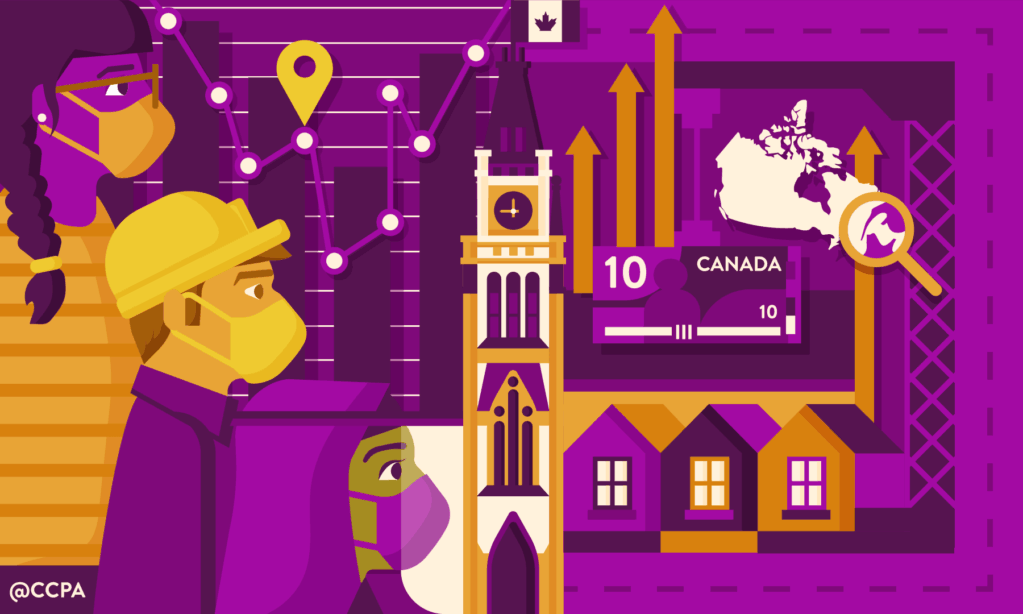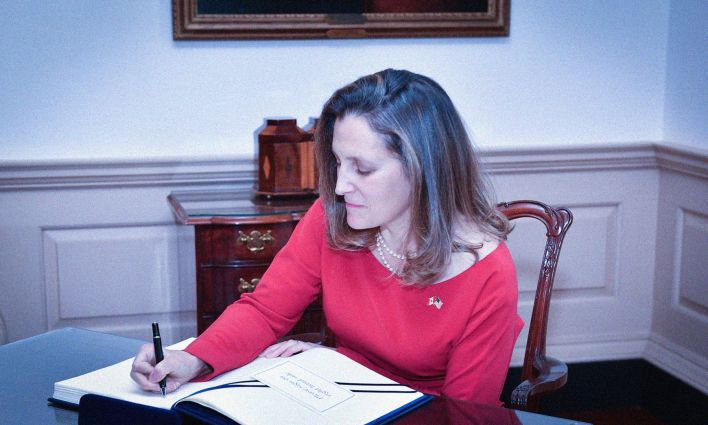April 19 will mark the first Liberal government budget since it was re-elected in 2019—and the first since the coronavirus pandemic struck.
Budgets are about choices. Given the monumental challenges going forward and the consequences of not facing them head-on, this budget will have only one precedent: wartime budgets during World War II.
The budget will likely build on important, though far from perfect, measures the federal government has already implemented to address the social, health and economic effects of the pandemic on Canadian society. However, its overarching mandate must be to confront the social and economic inequality crisis laid bare by the pandemic and the climate crisis. Both are bound together.
The fall throne speech signalled significant changes on climate and inequality, but the subsequent fiscal update did little to flesh out these promises.
Will this budget provide a blueprint accompanied by decisive action? Or will this government simply continue down the incrementalism path?
Will the elites, or the plutocracy—which Finance Minister Chrystia Freeland understands well, having written a book about plutocrats—define the parameters of change so as not to threaten its hold on power and privilege?
Will the Liberal leadership—the inner circle of the corporate-political establishment—break out of the ideological blinders that have shaped public policy for more than four decades and, instead, embrace a bold new paradigm, as occurred after World War II?
Or will the self-regulating market orthodoxy (what Lars Osberg calls "zombie neoliberalism”), though suspended during the pandemic, return in its aftermath with only minor adjustments?
Will this federal budget impose strict carbon reduction targets on corporations? Or will it be content to let private sector Environmental, Social and Governance investment fund initiatives, currently in vogue, carry the day?
Will strict carbon reduction targets be in the budget?
The federal carbon price increase, which has been legitimated by the Supreme Court of Canada’s recent ruling, is a necessary step in dealing with climate change.
However, its climate legislation, which seeks to establish national accountable carbon reduction targets, remains bogged down at second reading five months after it was introduced.
When juxtaposed with the federal government’s purchase of a pipeline and its ongoing fossil fuel subsidies, Canada has a way to go to exit from the cellar of country rankings on the Climate Performance Index.
Will this federal budget impose strict carbon reduction targets on corporations? Or will it be content to let private sector Environmental, Social and Governance [ESG] investment fund initiatives, currently in vogue, carry the day?
Will the approach that former central banker Mark Carney, currently Special UN Envoy on Climate Change, advocates in his book Value(s) Building a Better World for All influence this budget? He writes that with the right climate policy leadership the private sector “will get behind it and be decisive,” in accordance with society’s values.
Or is Carney being overly optimistic that governments will impose the necessary laws and regulations and that corporations will follow suit, whether or not their climate actions prioritize profits?
Tariq Fancy resigned as chief officer of sustainable investing at BlackRock, the world’s largest private investment corporation, with $1.9 trillion in assets, $200 billion of which are ESG funds. In an interview with The Independent, Fancy called ESG funds a PR spin comparable to the strategies of the tobacco and fossil fuels industries and a “deadly distraction” that delays overdue government reforms from the required systemic change.
The top three asset management corporations led by BlackRock, which hold leading share positions in 90% of the S&P index companies, wield enormous power over corporate decision-making.
Given the stakes for the planet—“Carbon dioxide levels are now higher than at any time in the past 3.6 million years"— does it make sense for governments to rely on these corporations to pursue actions that impair their pursuit of profit and power above all?
The global billionaires club grew by one-third—to 2,755—in 2021, increasing their combined wealth from $8T to $13.1T. The trend for their Canadian members was similar, even as finances reported by 35% of Canadians worsened.
Will the government reign in “unscrupulous moneychangers”?
Budgets are primarily about fiscal measures, but it is also common for them to address related legislative and regulatory measures.
Will the government rein in what Keynes called the oppressive speculative power of "functionalist financial investors,” which bear great responsibility for having brought on this historical moment? Echoing FDR’s 1933 inaugural address, will it bar “unscrupulous moneychangers” from the temple? For a start, it could impose a financial transactions tax to curb stock market speculation.
Will the Bank of Canada and the Office of the Superintendent of Financial Institutions (OSFI) reign in financial institutions with their enormous appetite for fossil fuels lending and impose strict short-term carbon emissions targets and fossil fuel lending phase out plans in line with the government’s climate legislation? Or will its acquiescence to financial sector hegemony prevail?
Will the budget move to eliminate fossil fuel subsidies and legislate just transition measures for affected communities and workers? Will it make major investments in carbon-free infrastructure, including: building retrofits, electrification of railways, pumping stations for electric vehicles and sustainable agriculture, to name a few?
Other measures put forward by expert organizations can provide additional guidance. In the U.S., the Biden administration has pledged $2.5 trillion for climate investments—eight times, per capita, greater than what Canada has announced.
Will the budget reign in income inequality?
The inequality and climate crises are inextricably bound together, as evidenced by a recent study in the journal Nature. Even as extreme weather events are mounting, so, too, are the extremes of inequality worsening during the pandemic.
The global billionaires club grew by one-third—to 2,755—in 2021, increasing their combined wealth from $8 trillion to $13.1 trillion. The trend for their Canadian members was similar, even as finances reported by 35% of Canadians worsened.
Between 1982 and 2018, average incomes for the top 1% doubled in Canada. However, most of those income gains came from the top 0.01%, whose average income expanded by more than $5 million, or 189%, during this period.
Average real income for the bottom half of the income distribution declined during this period. Average Canadian CEO pay is now 202 times greater than that of the average worker, roughly a 10-fold increase since the late-1970s.
The top 1% hold almost 26% of the country’s total wealth; the bottom 40% of families—6.4 million families—hold 1.2% of total family wealth, i.e. basically nothing.
Between 2010 and 2019, only the top 1% increased its share of total wealth, while it fell for everyone else. Canada’s 100 billionaires have as much wealth as the poorest 12 million Canadians.
Will the government put in place long-shunned inequality-reduction fiscal measures? There is a range of options:
- A wealth tax on the super-rich;
- A hike in the income tax rate on the richest 1% and corporations—measures which even the IMF is recommending, albeit temporarily;
- A shut down of tax loopholes;
- Additional resources for the Canada Revenue Agency to conduct tax audits;
- A surtax on the pandemic profiteers;
- Limits on tax deductible CEO compensation.
On the expenditure side of the ledger, will the government put in place the necessary resources for long-promised programs, which largely benefit middle- and lower-income groups? They include:
- Universal pharmacare;
- Universal, affordable, quality publicly funded child care;
- Improved eldercare supports and services;
- Affordable housing and measures to contain the rising cost of home ownership;
- Measures to provide stability for the precarious and gig workforce via basic income and/or job guarantees.
Or will such measures be put off once again—for further study, consultation, negotiation? In other words: inaction.
Will the budget put muscle behind the oft-repeated Liberal "real change” mantra?
Will the federal government break out of the plutocratic enclave blinkered by its vested interest in retaining power, privilege and money?
These dual crises are upon us. The stakes could not be higher.








